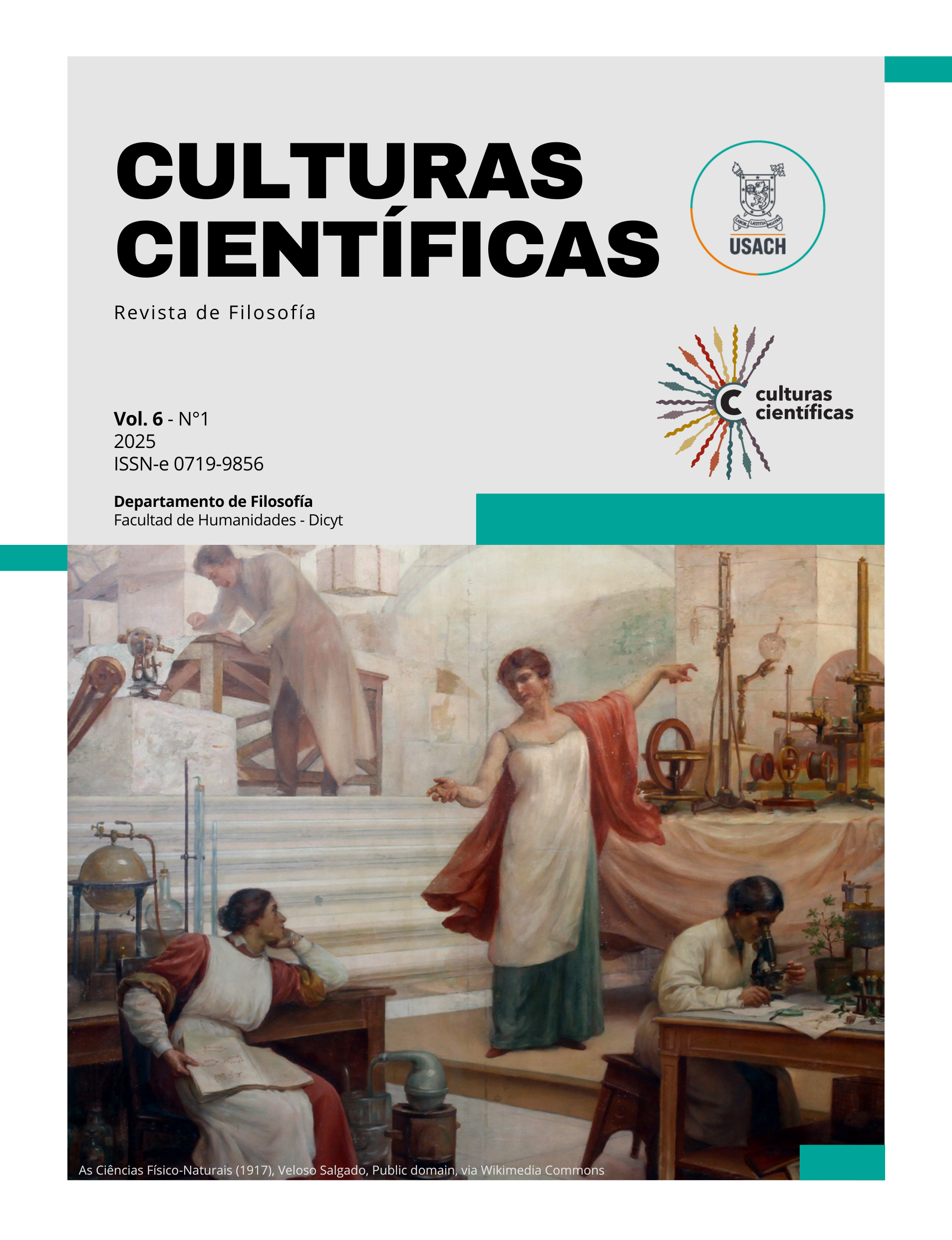Addressing McKenzie’s Challenge Regarding Progress in Naturalized Metaphysics
DOI:
https://doi.org/10.35588/cc.v6i177424Keywords:
Metametaphysics, Set theory, Jaccard index, Metaphysical relationship, Metaphysics of biologyAbstract
In this article, I elaborate a proposal to overcome McKenzie’s argument against the possibility of progress-talk in metaphysics (2020). McKenzie states that said discourse is not possible in metaphysics due to its “all-or-nothing” character: either metaphysical theories are true or not, without intermediaries, so the language of approximation cannot meaningfully apply to changes between metaphysical theories. I show that discussions regarding the type of metaphysical relationship between two relata are susceptible to retention and refinement, two criteria that McKenzie considers necessary for progress, as long as they tend towards better matching what is observable in reality. This is possible if metaphysical relationship types are characterized as sets of properties, from which the Jaccard Index between two sets can be utilised to determine the degree of similarity or approximation between relationship types. If such is the case, then a transition from one relationship thesis to another can be considered progress as long as some properties are retained and the change is guided by empirical evidence. Hence, progress-talk in naturalized metaphysics is possible according to McKenzie’s own criteria.
Downloads
References
Alvarado, J. (2013). Fundación y reducción. Aporía (6): 59–74.
Arenhart, J. R. B., & Arroyo, R. W. (2021). Back to the question of ontology (and metaphysics). Manuscrito, 44(2), 1–51. https://doi.org/10.1590/0100-6045.2021.v44n2.jr
Bigaj, T. & Wüthrich, C. (2015). Metaphysics in Contemporary Physics. Brill-Rodopi.
Bliss, R. (2024). Grounding, Fundamentality and Ultimate Explanations. Cambridge University Press. https://doi.org/10.1017/9781009089739
Boyer, C. B. (1949). The Concepts of the Calculus. Hafner Publishing Company.
Chalmers, D. J. (1996). The Conscious Mind: In Search of a Fundamental Theory. Oxford University Press.
Correia, F., & Schnieder, B. (2012). Grounding: An opinionated introduction. In F. Correia, B. Schneider (Eds.), Metaphysical Grounding (pp. 1–36). Cambridge University Press.
Dellsén, F., Firing, T., Lawler, I., & Norton, J. (2024). What is philosophical progress? Philosophy and Phenomenological Research, 109(2), 663–693. https://doi.org/10.1111/phpr.13067
Donohue, C., & Wolfe, C. T. (2023). Introduction: vitalism and its legacy in twentieth century life sciences and philosophy. In C. Donohue, C. T. Wolfe (Eds.), Vitalism and Its Legacy in Twentieth Century Life Sciences and Philosophy (pp. 1–7). Springer. https://doi.org/10.1007/978-3-031-12604-8_1
Ereshefsky, M. (2012). Homology thinking. Biology & Philosophy, 27(3), 381–400. https://doi.org/10.1007/s10539-012-9313-7
Maddy, P. (2000). Mathematical progress. In E. Grosholz, H. Breger (Eds.), The Growth of Mathematical Knowledge (pp. 341–352). Springer. https://doi.org/10.1007/978-94-015-9558-2_23
McKenzie, K. (2020). A curse on both houses: naturalistic versus a priori metaphysics and the problem of progress. Res Philosophica, 97(1), 1–29. https://doi.org/10.11612/resphil.1868
Moir, C. (2023). What is living and what is dead in political vitalism? In C. Donohue, C. T. Wolfe (Eds.), Vitalism and Its Legacy in Twentieth Century Life Sciences and Philosophy (pp. 239–261). Springer. https://doi.org/10.1007/978-3-031-12604-8_13
Morganti, M., & Tahko, T. E. (2016). Moderately naturalistic metaphysics. Synthese, 194(7), 2557–2580. https://doi.org/10.1007/s11229-016-1068-2
Kim, J. (2011). Philosophy of Mind (3rd ed.). Westview Press.
Lewis, D. (1983). New work for a theory of universals. Australasian Journal of Philosophy, 61(4), 343–377. https://doi.org/10.1080/00048408312341131
Lowe, E. J. (2009). The rationality of metaphysics. Synthese, 178(1), 99–109. https://doi.org/10.1007/s11229-009-9514-z
Palmgren, E., & Rasa, T. (2022). Modelling roles of Mathematics in Physics. Science & Education, 33(2), 365–382. https://doi.org/10.1007/s11191-022-00393-5
Pappas, G. S. (2009). Physicalism, materialism. In J. Kim, E. Sosa, G. S. Rosenkrantz (Eds.), A Companion to Metaphysics (pp. 484–486). Wiley-Blackwell.
Posteraro, T. S. (2023). Vitalism and the problem of individuation: Another look at Bergson’s élan vital. In C. Donohue, C. T. Wolfe (Eds.), Vitalism and Its Legacy in Twentieth Century Life Sciences and Philosophy (pp. 9–26). Springer. https://doi.org/10.1007/978-3-031-12604-8_2
Rickles, D. (2016). The Philosophy of Physics. Polity.
Rosenberg, A. (1978). The supervenience of biological concepts. Philosophy of Science, 45(3), 368–386. https://doi.org/10.1086/288813
Sober, E. (1999). The multiple realizability argument against reductionism. Philosophy of Science, 66(4), 542–564. https://doi.org/10.1086/392754
Sober, E. (2024). The Philosophy of Evolutionary Theory. Cambridge University Press. https://doi.org/10.1017/9781009376037
Uhden, O., Karam, R., Pietrocola, M., & Pospiech, G. (2011). Modelling mathematical reasoning in Physics education. Science & Education, 21(4), 485–506. https://doi.org/10.1007/s11191-011-9396-6
Villalobos, M., & Razeto-Barry, P. (2019). Are living beings extended autopoietic systems? An embodied reply. Adaptive Behavior, 28(1), 3–13. https://doi.org/10.1177/1059712318823723
Worrall, J. (1989). Structural realism: The best of both worlds? Dialectica, 43(1–2), 99–124. https://doi.org/10.1111/j.1746-8361.1989.tb00933.x
Downloads
Submitted
2025-06-13Published
Issue
Section
License
Copyright (c) 2025 Javier Silva Silva

This work is licensed under a Creative Commons Attribution 4.0 International License.











